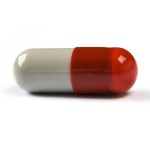 These days there seems to be medicine to treat every ailment. Did you know that the foods we eat could affect how medicine works in our bodies? For example, vitamin K interacts with medications that thin the blood, such as Coumadin (Warfarin).
These days there seems to be medicine to treat every ailment. Did you know that the foods we eat could affect how medicine works in our bodies? For example, vitamin K interacts with medications that thin the blood, such as Coumadin (Warfarin).
Vitamin K is needed to help the body make blood clots. Without this vitamin, we would bleed to death. However, some people’s bodies produce too many blood clots, which can lead to a heart attack or stroke. These people must use drugs such as Coumadin (Warfarin) to thin the blood to decrease the amount of clotting that occurs. People taking these medications must be aware of the amounts of vitamin K containing foods that they eat and should consult with a registered dietitian, a pharmacist or their physician.
This does not mean that foods that contain vitamin K should not be eaten. Recently, studies have shown that vitamin K is needed, along with calcium and vitamin D, for making and keeping our bones strong. Our bodies do not make enough vitamin K on their own to keep our bones healthy, so it is important to consume sources that are found in foods.
Here are some suggestions regarding vitamin K intake for people taking Coumadin (Warfarin):
- Limit foods considered “high” or “moderately high” in vitamin K.
- Try to keep the vitamin K intake consistent from day to day so that the amount of vitamin K your body is getting stays the same.
- Consume foods considered “low” in vitamin K as desired.
- Report any changes in your diet to your physician.
Foods considered high in vitamin K include Swiss chard, turnip greens, kale, collard greens, spinach and Brussels sprouts. Moderately high sources include soybean oil, canola oil, green cabbage, broccoli and dry chickpeas. Some foods considered low in vitamin K include squash, potatoes, onions and animal products such as liver and dairy products.
It is clear that vitamin K, like many other vitamins and nutrients, has an important role in keeping our bodies running smoothly. It is also clear that when taking any medications, it is important to check with your doctor, pharmacist or dietitian about any possible drug-nutrient interactions.
WRITTEN BY THE PUBLIC HEALTH NUTRITIONISTS OF SASKATCHEWAN
Originator: Andrea Gillies, Dietetic Intern for J. Okroj, RHD
References:
“Advice to Patients on Warfarin on Vitamin K Intake,” Nutrition and the M.D., March 2002.
Drug Information Line, University of Saskatchewan, “Warfarin (Coumadin).”
“For Better Bones, Green Vegetables,” Tufts University Health and Nutrition Letter, March 1999. 17:1.
“Green for Bones,” UC Berkeley Wellness Letter, July 1999.
NIH Clinical Center’s Drug-Nutrient Interaction Task Force, “Common Food Sources of Vitamin K.”
NIH Clinical Center’s Drug-Nutrient Interaction Task Force, “Warfarin (Coumadin).”






